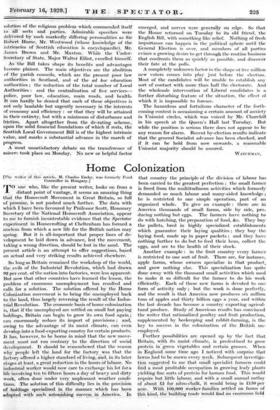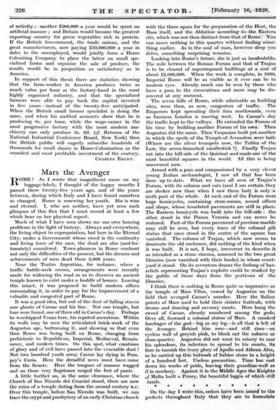Home Colonization
[The writer of this article, M. Charles Ereky, was formerly Food Controller in Hungary.]
TO one who, like the present writer, looks on from a distant point of vantage, it seems an amazing thing that the Homecroft Movement in. Great Britain, so full of promise, is not puthed much further. The data with which I have been favoured by Professor Scott, Honorary Secretary of the National Ilomecroft Association, appear to me to furnish incontestable evidence that the Spectator experiment in Hornecrofting at Cheltenham has formed a nucleus from which a new life for the British nation may spring. But it is, all-important that proper lines of de= velopment be laid down in advance, lest the movement; taking a wrong direction, should be lost in the sand. The present article is an attempt to offer suggestions, baSed on actual and very striking results achieved elsewhere.
So long as. Britain remained the workshOp of the world, the • evils of the Industrial Revolution, which had drawn 92 per cent. of the nation into factories, were less apparent. But now that other countries have learned the lesson, the problem of enormous unemployment has resulted and calls for a solution. The solution offered by the Home Colonization movement is to bring the unemployed back to the land, thus largely reversing the result of the Indus- trial Revolution. The economic basis of home colonization is-, that if the unemployed are settled on small but paying holdings, Britain can begin to grow its own food again ; can enormously reduce its import of provisions ; and, owing to the advantage of its moist climate, can even develop into a food-exporting country for certain products. It has, however, to be borne in mind that the new move= ment must not run contrary to the direction of social development. It should be remembered that the reason why people, left the land for the factory was that the factory offered a higher standard of living, and, in its later stages at least, a great reduction in the hours of labour. No industrial worker would now care to exchange his lot fora life involving ten to fifteen hours a day of heavy and dirty work, often done under very unpleasant weather condi- tions. The solution of this difficulty lies in the provision of holdings specialized in the manner which has been adapted with such astonishing success . in America. In that country the principle of the division of labour has been carried to the greatest perfection ; the small farmer is freed from the multitudinous activities which formerly demanded so much labour and manysided knowledge ; he is restricted to one simple operation, part of an organized whole, To give an example : there are in America thousands of small farms, side by side, 'pro- ducing nothing but eggs. The farmers have nothing to do with hatching, the preparation of food, &c: They buy the pullets, bred in highly specialized- establishments which guarantee their laying qualities ; they buy the laying food, made up in paper packets ; and they have nothing further to do but to feed their hens, collect the eggs, and see to the health of their stock.
Another example : in the fruit country every farmer is restricted to one sort of fruit. There are, for instance, apple farms, whose owners specialize in that product, and grow nothing else. This specialization has quite done away with the thousand small activities which used to make it so difficult for the farmer to do his work efficiently. Each of these new farms is devoted' to one form of activity only ; but the work is done perfectly, and the result is that America now produces six million tons of apples and thirty billion eggs a year, and within the last decade has become a country exporting agricul- tural produce. Study of American results has convinced the writer that rationalized poultry and fruit, production, supplemented by beekeeping and rabbit-farming, is the key to. success in the colonization of the . British un- employed.
Further possibilities are opened up by the fact that Britain, with its moist • climate, is predestined to grow protein in green vegetables and certain grasses. When in England: some time ago I noticed with surprise that lawns had to be mown every 3yeek., Subsequent investiga- tion suggested to me that small specialiit farmers could find a most profitable occupation in growing leafy plants yielding fine sorts of protein for human food. This would require but:little labour, and with a small annual Outlay of about £5 for nitro-chalk, it would bring in £150 per acre. With 100,000 Worker-families„ settled on farms of this kind, .the building trade would find an morn-ions 'field of activity ; another L500,000,a year would- be spent on artificial manure ; and Britain would become the greatest exporting country for green vegetables rich in protein. If the British Government, the trade unions, and the great manufacturers, now paying £50,000,000 a year in doles to the unemployed, would jointly form a Home Colonizing Company to place the latter on small spe- cialized farms and organize the sale of produce, the results would be in proportion as satisfactory as in America. In support of this thesis there are statistics showing that the farm-worker in America produces twice as much value per hour as the, factory-hand in the most highly organized industry, and that the specialized farmers were able to pay back the capital invested in five - years—instead of the- twenty-five anticipated. When the British small farmer specialist is doing the same, and, when his audited accounts show that he is producing 6s. per hour, while the wage-earner in the most progressive factory with the most modem ma- chinery can only produce 2s. 6d. (cf. Returns of the National Industrial Conference Board, New York) then the British public will eagerly subscribe - hundreds of thousands for small shares in Home-Colonization as the soundest and most profitable investment of the century.
CHARLES EREKY.











































 Previous page
Previous page